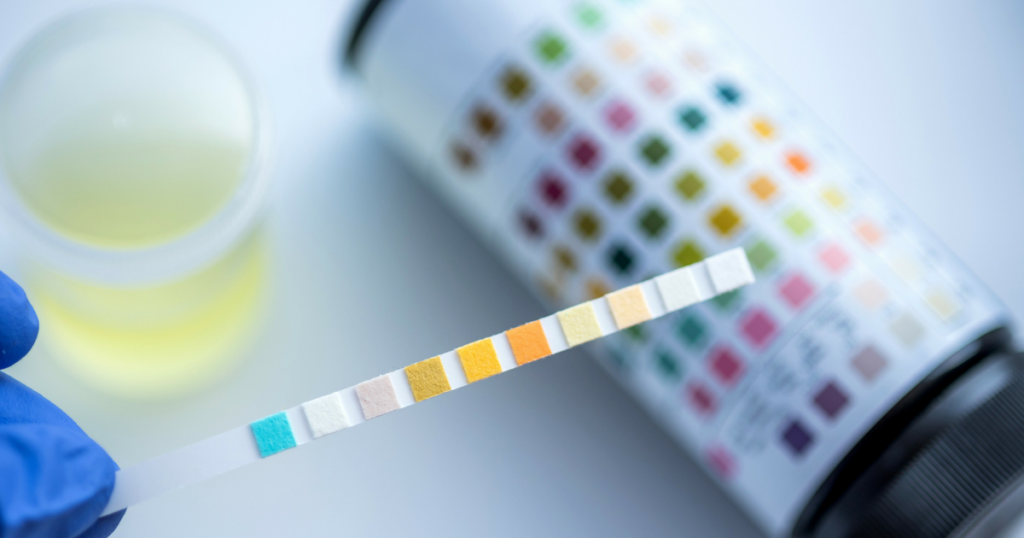Key Takeaways:
- Urine pH measures the acidity or alkalinity of urine.
- Normal urine pH ranges from 4.5 to 8.0.
- Diet, medications, and health conditions can all influence urine pH.
- Knowing your urine pH helps detect health conditions, such as kidney stones or urinary tract infections.
What is Urine pH?

Urine pH tells us how acidic or alkaline your urine is. Imagine a scale from 1 to 14, with 7 being neutral. Below 7 is acidic, and above 7 is alkaline. If your urine pH is at 5, it’s acidic; if it’s at 8, it’s more alkaline.
Why does this number matter? It’s not just a random figure—it reflects your body’s health, diet, hydration, and more. You don’t need a Ph.D. to get it, but it does offer clues about what’s going on inside.
Normal Range for Urine pH
A typical urine pH falls between 4.5 and 8.0. Slight changes are normal; they depend on diet, water intake, and even the time of day. For instance, a protein-rich meal may lower your urine’s pH, making it more acidic, while a diet full of vegetables may raise it to be more alkaline.
Causes of Abnormal Urine pH Levels
Let’s explore what might cause the pH to change.
Acidic Urine (Low pH)
A urine pH below 5.5 could indicate an excess of acid in the body. Here are a few reasons why:
- Dehydration: Less water makes urine more concentrated and acidic.
- Diabetic Ketoacidosis: A severe diabetes complication where excess ketones make the body acidic.
- Metabolic Acidosis: The body generates too much acid or loses too much bicarbonate, common in kidney issues.
- Respiratory Acidosis: This results when the body can’t expel enough carbon dioxide, often due to lung conditions like asthma.
- Medications: Drugs like ammonium chloride or methenamine can lower urine pH.
Alkaline Urine (High pH)
Urine pH above 7.5 might mean your urine is alkaline. Here’s why this can happen:
- Urinary Tract Infections (UTIs): Certain bacteria cause UTIs that make urine more alkaline.
- Kidney Tubular Acidosis: A kidney condition where urine isn’t acidified properly.
- Certain Medications: Sodium bicarbonate or potassium citrate can make urine alkaline.
- Respiratory Alkalosis: Excessive carbon dioxide loss can make the body alkaline.
- Prolonged Vomiting: Frequent vomiting removes stomach acid, raising urine pH.
Factors Influencing Urine pH
Dietary Influences:
- Foods like meat, cheese, and grains can make urine acidic. Conversely, fruits, veggies, and legumes often make it alkaline.
Medications and Supplements:
- Various medicines, from diuretics to antacids and steroids, can alter urine pH.
Hydration Status:
- Water intake significantly impacts urine concentration and pH.
Medical Conditions:
- Health issues like UTIs, respiratory problems, and poor kidney function can change urine pH.
Testing and Measuring Urine pH
Wondering how to check your urine pH? It’s quite easy!
Methods of Testing:
The common method is the dipstick test—a thin strip that changes color when dipped in urine, similar to a mood ring. In seconds, it shows your pH level. Other methods include using pH paper strips or lab tests for detailed analysis.
Interpreting Results:
Remember, a one-time pH reading might not provide the whole picture, as it can fluctuate throughout the day. If your results consistently show very high or low pH, consult a healthcare provider.
Clinical Significance of Urine pH

Why should you care about your urine pH?
- Kidney Stones: A pH below 5.5 increases the risk for uric acid stones, while above 7.2 may suggest a risk for calcium phosphate stones.
- UTIs: Monitoring pH helps track infections and treatment effectiveness.
- Chronic Kidney Disease: Stable urine pH may slow the progression of kidney diseases.
Tips for Maintaining a Healthy Urine pH
Want to keep your pH in the safe zone? Here are some simple steps:
- Balanced Diet: Include fruits, vegetables, grains, and proteins in your meals.
- Stay Hydrated: Aim for 8 glasses of water daily.
- Monitor Medications: Discuss with your doctor if your medications might affect urine pH.
- Regular Testing: Regular checks can help you keep tabs on your health.
Frequently Asked Questions (FAQs)
What symptoms might suggest abnormal urine pH?
Painful urination, blood in urine, or foul-smelling urine could mean something’s up with your pH.
How often should you check your urine pH?
Occasionally is fine for most, but more frequent checks are suggested if you have specific health concerns.
Can urine pH change during the day?
Absolutely! Factors like diet, hydration, and time of day can cause pH fluctuations.
Conclusion
Understanding urine pH can give you insights into your health. While it’s a small number, it speaks volumes about what’s happening in your body. So, whether managing a condition or just curious, keeping an eye on your urine pH can help you stay informed.
For a comprehensive way to monitor your health at home, consider using RibbonCheckup, a convenient and advanced solution for regular testing and insights.
Remember, while at-home testing is a great tool, any persistent abnormalities should be discussed with a healthcare professional. Your health is worth the effort!

Jean Smith is a fitness enthusiast and blogger who focuses on fitness and a healthy lifestyle. She is passionate about assisting people in living healthier lifestyles and is constantly on the lookout for new and creative methods to stay fit and healthy. Her articles are excellent resources for anyone interested in improving their health and fitness.
